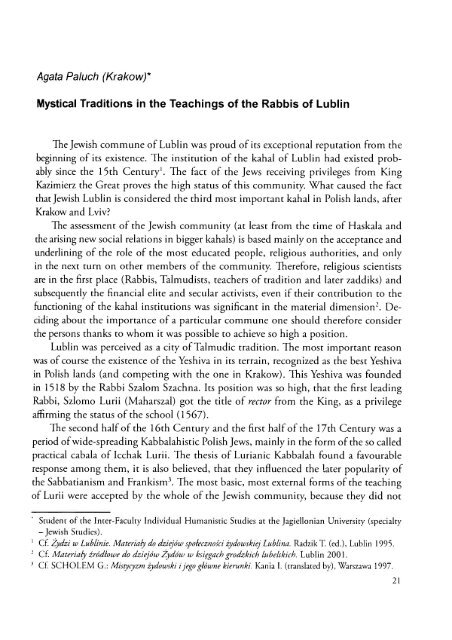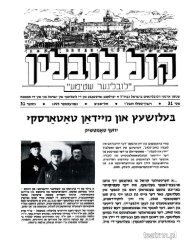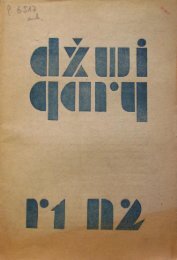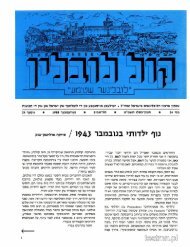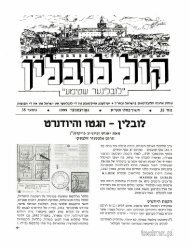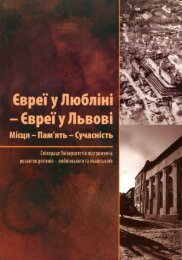The Jews in Lublin - Biblioteka Multimedialna Teatrnn.pl - Brama ...
The Jews in Lublin - Biblioteka Multimedialna Teatrnn.pl - Brama ...
The Jews in Lublin - Biblioteka Multimedialna Teatrnn.pl - Brama ...
Create successful ePaper yourself
Turn your PDF publications into a flip-book with our unique Google optimized e-Paper software.
Agata Paluch (Krakow)*<br />
Mystical Traditions <strong>in</strong> the Teach<strong>in</strong>gs of the Rabbis of Lubl<strong>in</strong><br />
<strong>The</strong> Jewish commune of Lubl<strong>in</strong> was proud of its exceptional reputation from the<br />
beg<strong>in</strong>n<strong>in</strong>g of its existence. <strong>The</strong> <strong>in</strong>stitution of the kahal of Lubl<strong>in</strong> had existed probably<br />
s<strong>in</strong>ce the 15th Century 1 . <strong>The</strong> fact of the <strong>Jews</strong> receiv<strong>in</strong>g privileges from K<strong>in</strong>g<br />
Kazimierz the Great proves the high status of this community. What caused the fact<br />
that Jewish Lubl<strong>in</strong> is considered the third most important kahal <strong>in</strong> Polish lands, after<br />
Krakow and Lviv?<br />
<strong>The</strong> assessment of the Jewish community (at least from the time of Haskala and<br />
the aris<strong>in</strong>g new social relations <strong>in</strong> bigger kahals) is based ma<strong>in</strong>ly on the acceptance and<br />
underl<strong>in</strong><strong>in</strong>g of the role of the most educated peo<strong>pl</strong>e, religious authorities, and only<br />
<strong>in</strong> the next turn on other members of the community. <strong>The</strong>refore, religious scientists<br />
are <strong>in</strong> the first <strong>pl</strong>ace (Rabbis, Talmudists, teachers of tradition and later zaddiks) and<br />
subsequently the f<strong>in</strong>ancial elite and secular activists, even if their contribution to the<br />
function<strong>in</strong>g of the kahal <strong>in</strong>stitutions was significant <strong>in</strong> the material dimension 2 . Decid<strong>in</strong>g<br />
about the importance of a particular commune one should therefore consider<br />
the persons thanks to whom it was possible to achieve so high a position.<br />
Lubl<strong>in</strong> was perceived as a city of Talmudic tradition. <strong>The</strong> most important reason<br />
was of course the existence of the Yeshiva <strong>in</strong> its terra<strong>in</strong>, recognized as the best Yeshiva<br />
<strong>in</strong> Polish lands (and compet<strong>in</strong>g with the one <strong>in</strong> Krakow). This Yeshiva was founded<br />
<strong>in</strong> 1518 by the Rabbi Szalom Szachna. Its position was so high, that the first lead<strong>in</strong>g<br />
Rabbi, Szlomo Lurii (Maharszal) got the title of rector from the K<strong>in</strong>g, as a privilege<br />
affirm<strong>in</strong>g the status of the school (1567).<br />
<strong>The</strong> second half of the 16th Century and the first half of the 17th Century was a<br />
period of wide-spread<strong>in</strong>g Kabbalahistic Polish <strong>Jews</strong>, ma<strong>in</strong>ly <strong>in</strong> the form of the so called<br />
practical cabala of Icchak Lurii. <strong>The</strong> thesis of Lurianic Kabbalah found a favourable<br />
response among them, it is also believed, that they <strong>in</strong>fluenced the later popularity of<br />
the Sabbatianism and Frankism 3 . <strong>The</strong> most basic, most external forms of the teach<strong>in</strong>g<br />
of Lurii were accepted by the whole of the Jewish community, because they did not<br />
Student of the Inter-Faculty Individual Humanistic Studies at the Jagiellonian University (specialty<br />
-Jewish Studies).<br />
1 Cf. Żydzi w Lubl<strong>in</strong>ie. Materiały do dziejów społeczności żydowskiej Lubl<strong>in</strong>a. Radzik T. (ed.), Lubl<strong>in</strong> 1995.<br />
2 Cf. Materiały źródłowe do dziejów Żydów w księgach grodzkich lubelskich. Lubl<strong>in</strong> 2001.<br />
3 Cf. SCHOLEM G.: Mistycyzm żydowski i jego główne kierunki. Kania I. (translated by), Warszawa 1997.<br />
21


